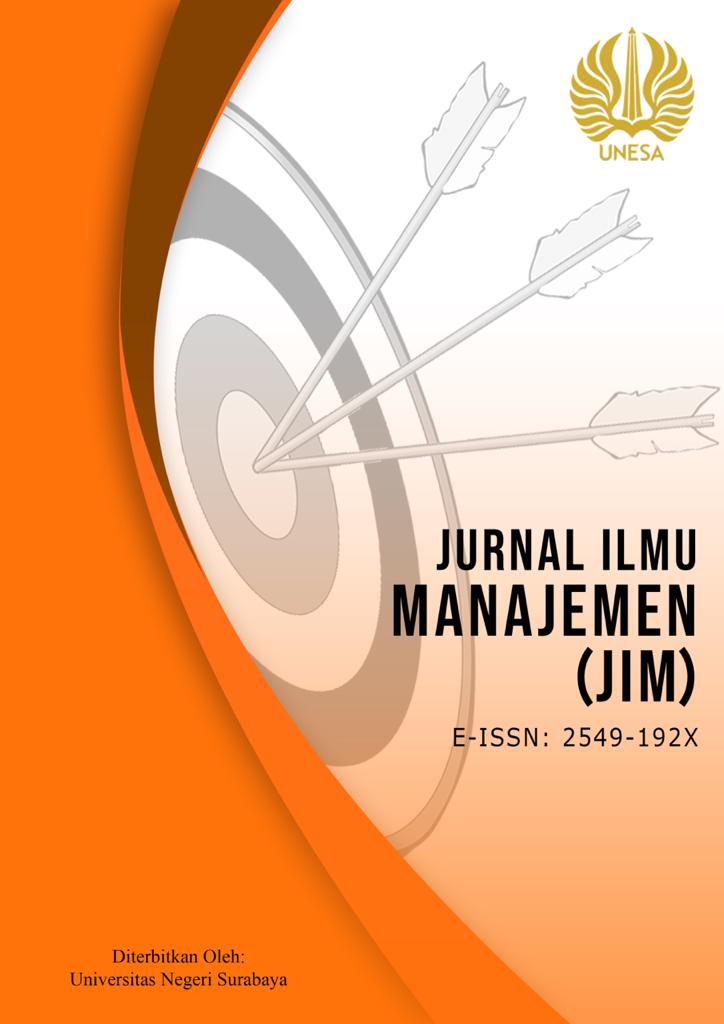Pengaruh psychological well-being dan work life balance terhadap job performance melalui work engagement pada perawat generasi z
DOI:
https://doi.org/10.26740/jim.v12n2.p227-242Keywords:
job performance, psychological well being, work engagement, work life balanceAbstract
This research aims to determine and explain the effect of psychological well-being and work-life balance on job performance through work engagement in Z-generation nurses at a private hospital in Sidoarjo Regency. This research is classified as quantitative research with a population of 116 nurses belonging to Generation Z, and the sampling technique used proportionate stratified random sampling with a total sample of 90 Generation Z nurses. The statistical analysis used in this research was Structural Equation Modeling (SEM) with the help of Smart software Partial Least Squares (PLS) 3.2.9. The results of this research show that psychological well-being has a significant positive effect on work engagement, work-life balance has a considerable positive impact on work engagement, work engagement does not affect job performance, psychological well-being has a significant positive effect on job performance, work-life balance does not affect job performance, work engagement cannot mediate the influence of psychological well-being on job performance, work engagement cannot mediate the impact of work-life balance on job performance. The implications are based on the results applied to companies where superiors can organize decision-making training programs for Generation Z nurses and hold individual counseling and coaching sessions as a skill development path for employee orientation mentoring programs. Apart from that, superiors can also monitor employee satisfaction to provide opportunities for employees to be involved in decision-making.
References
American Psychological Association. (2018). Stress in America Tm Generation Z. (Retrieved 11 November 2023 from https://www.google.com/url?sa=t&rct=j&q=&esrc=s&source=web&cd=&ved=2ahUKEwiC2KGCq8uCAxVkzjgGHd_OA8oQFnoECCEQAQ&url=https%3A%2F%2Fwww.apa.org%2Fnews%2Fpress%2Freleases%2Fstress%2F2018%2Fstress-gen-z.pdf&usg=AOvVaw1MM_4j3oTtrCCUhWwQ3Z3O&opi=89978449)
Bakker, A. B., & Leiter, M. P. (2010). Work Engagement A Handbook of Essential Theory and Research. Psychology Press. (Retrieved 14 November 2023 from https://www.libgen.is/book/index.php?md5=F25E297D1D401140668D15481C5F8AD2)
Beardwell, J., & Thompson, A. (2017). Human Resource Management: a Contemporary Approach (E. Gate, Ed.; Eighth (8). Pearson Education. www.pearson-books.com
Bintoro, & Daryanto. (2017). Manajemen Penilaian Kinerja Karyawan. GAVA MEDIA
Colquitt, J. A., LePine, J. A., & Wesson, M. J. (2017). Organizational Behavior : Improving Performance and Commitment in the Workplace (Fifth (5). Mc Graw-Hill Education. https://www.libgen.is/book/index.php?md5=2F41D3B959C9FEAE14BE6C80E4E39744
Deloitte. (2018). 2018 Deloitte Millennial Survey Millennials Disappointed in Business, Unprepared For Industry 4.0. (Retrieved 11 November 2023 from https://www2.deloitte.com/tr/en/pages/about-deloitte/articles/millennialsurvey-2018.html)
Deloitte. (2022). Striving For Balance, Advocating for Change The Deloitte Global 2022 Generasi Z & Millennial Survey. (Retrieved 11 November 2023 from https://www2.deloitte.com/id/en/pages/about-deloitte/articles/millennialsurvey.html)
Ghozali, Imam. (2021). Structural Equation Modeling dengan Metode Alternatif Partial Least Square (Edisi ke 5). Badan Penerbit Universitas Diponegoro
Lever. (2022). Great Resignation: The State of Internal Mobility and Employee Retention Report. (Retrieved 11 November 2023 from https://www.lever.co/research/2022-internal-mobility-and-employee-retention-report/)
Mendis, M. D. V. S., & Weerakkody, W. A. S. (2017). The Impact of Work-Life Balance on Employee Performance Concerning Telecommunication Industry in Sri Lanka: A Mediation Model. Kelaniya Journal of Human Resource Management, 12(1), 72. https://doi.org/10.4038/kjhrm.v12i1.42
Paramitta, A., & Irvan Dwi Putra, A. (2020). Work Engagement Ditinjau dari Psychological Well-Being pada Karyawan PT. Sumatera Berlian Motors. In Philanthropy Journal of Psychology, 4(1), 45-56. https://doi.org/http://dx.doi.org/10.26623/philanthropy.v4i1.1702
Pratiwi, J. A., & Fatoni, F. (2023). Pengaruh Employee Engagement Dan Work Life Balance Terhadap Kinerja Karyawan Melalui Kepuasan Kerja. Jurnal Ilmu Manajemen, 11(2), 432-444.
Prasetyo et al. (2023). Pengaruh Role Stress, Emotional Intelligence, dan Aspek Psychological Well-Being terhadap Kinerja Auditor. In Balance: Media Informasi Akuntansi dan Keuangan, 15(1), 15-20. https://e-journal.upr.ac.id/index.php/blnc/article/download/8602/4464
Rijal, F., & Abdullah, M. W. (2020). Pengaruh Healty Lifestyle, Psychological well-being, dan Self Efficacy terhadap Kinerja Auditor dengan Task Complexity sebagai Pemoderasi. Jurnal Akuntansi Kajian Ilmiah Akuntansi (JAK), 7(1), 22. https://doi.org/10.30656/jak.v7i1.1467
Schaufeli, W., & Bakker, A. (2003). Uwes Utrecht Work Engagement Scale (1st ed.). Occupational Health Psychology Unit. https://scales.arabpsychology.com/s/utrecht-work-engagement-scale-uwes-schaufeli-bakker-2003-2006-2007/
Sugiyono. (2013). Metode Penelitian Kuantitatif Kualitatif dan R&D. Bandung: Alfabeta. Tersedia dari https://anyflip.com/utlqr/qtha
Downloads
Published
How to Cite
Issue
Section
License

This work is licensed under a Creative Commons Attribution-NonCommercial 4.0 International License.
 Abstract views: 3168
,
Abstract views: 3168
, PDF Downloads: 1734
PDF Downloads: 1734











